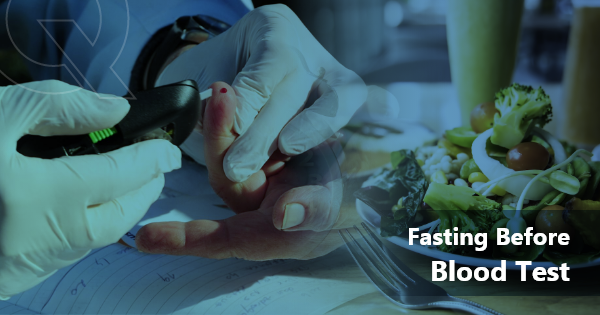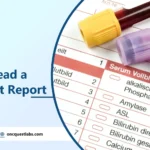Blood tests are an essential aspect of modern healthcare, helping doctors diagnose, monitor, and manage various medical conditions. However, what many people may not realize is that fasting before specific blood tests is a crucial requirement. In this comprehensive blog, we will explore the significance of fasting before a blood test, which tests require it, the reasons behind fasting, how to prepare, and some common misconceptions.
Contents
Why Fasting Before a Blood Test?
Fasting before a blood test involves refraining from consuming any food or beverages (except water) for a specific period before the test. The primary reasons for fasting before certain blood tests include:
1. Accurate Blood Sugar Measurement: Fasting blood sugar (FBS) tests and glucose tolerance tests (GTT) are commonly used to measure blood sugar levels. Fasting helps ensure that the food you eat does not affect your blood sugar levels, providing an accurate baseline for diagnosis and monitoring of conditions like diabetes.
2. Lipid Profile Assessment: Lipid profile tests measure cholesterol levels, including total cholesterol, LDL cholesterol (often referred to as “bad” cholesterol), HDL cholesterol (“good” cholesterol), and triglycerides. Fasting is required to obtain accurate measurements, especially for triglycerides and LDL cholesterol.
3. Liver Function Testing: Some liver function tests, such as the fasting liver panel, may require fasting. Fasting can influence certain liver enzymes, so fasting helps ensure the results are not affected by recent food intake.
Preparing for Fasting Before a Blood Test:
If your healthcare provider has instructed you to fast before a blood test, here’s how you can prepare:
1. Follow Your Provider’s Instructions: Always adhere to the specific fasting instructions provided by your healthcare provider. The duration of fasting may vary depending on the test and your medical condition.
2. Hydration is Key: Although you should refrain from consuming most beverages, drinking plain water is typically allowed and encouraged. Staying hydrated can help make the fasting period more comfortable.
3. Medications and Supplements: Consult your healthcare provider regarding any medications or supplements you are taking. In some cases, you may need to temporarily discontinue or adjust your medication regimen during fasting.
4. No Food or Sugary Drinks: Avoid all food, including snacks, during the fasting period. Additionally, steer clear of sugary drinks, as they can affect blood sugar levels.
Common Misconceptions:
There are some common misconceptions related to fasting before a blood test:
1. No Water Allowed: As mentioned earlier, drinking water is typically allowed and encouraged during fasting. It helps prevent dehydration and ensures that you are comfortable during the fasting period.
2. Black Coffee or Tea: It’s a common belief that black coffee or tea without sugar or cream is acceptable during fasting. However, it’s best to clarify this with your healthcare provider, as some tests may require complete abstinence from beverages other than water.
3. Brushing Teeth: Brushing your teeth with plain water is generally allowed during fasting. However, avoid using toothpaste, as it may contain sugars or other substances that could affect blood test results.
Conclusion:
Fasting before a blood test is a crucial requirement for specific tests, as it ensures the accuracy of the results. It provides a baseline measurement unaffected by recent food intake, helping healthcare providers make accurate diagnoses and treatment decisions. If you have any questions or concerns about fasting before a blood test, always consult your healthcare provider. Remember to follow their instructions carefully to ensure the test results are as reliable as possible.
Overall, fasting before a blood test is a simple yet vital step in maintaining good health and facilitating accurate medical assessments. It’s a small sacrifice that can yield significant benefits in terms of disease detection and management.
Frequently asked Questions
Q1:Do you have to fast for 12 hours before a blood test?
A1:Blood tests that might necessitate fasting include:
1. Fasting Blood Glucose Test (Diabetes Screening): You might be required to fast for a duration of 8 to 10 hours before this test. It’s commonly used to assess blood sugar levels and screen for diabetes.
2. Iron Blood Test (Diagnosing Iron Deficiency Anemia): This test could call for a fasting period of 12 hours. It’s employed to diagnose conditions like iron deficiency anemia by measuring iron levels in the blood.
Q2:What are the rules for fasting for blood work?
A2: 12-hour fasting period typically entails abstaining from all food and beverages except water. For instance, if your appointment is scheduled for 8 a.m. and your healthcare provider instructs an 8-hour fast, you should only consume water after midnight. In the case of a 12-hour fast, it’s important to refrain from both food and drink after 8 p.m. on the evening before the test. These guidelines ensure the accuracy of blood test results.




![Blood Test for Hair Loss [Male/Female] Blood Test for Hair Loss](https://oncquest-blog.s3.ap-south-1.amazonaws.com/blog/wp-content/uploads/2023/12/12044200/Blood-Test-for-Hair-Loss.webp)
